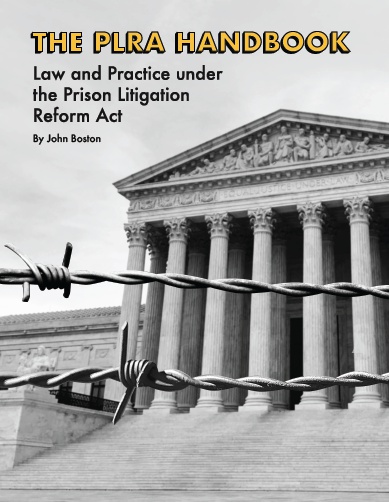PLN managing editor responds to CCA editorial with counter-editorial
Tennessean, Jan. 1, 2013.
http://www.tennessean.com/article/20131026/OPIN...
PLN managing editor responds to CCA editorial with counter-editorial - Tennessean 2013
CCA's argument specious
Oct. 26, 2013 4:03 AM
Upon reading the Oct. 23 Tennessee Voices op-ed by Corrections Corporation of America Executive Vice President Harley Lappin, titled “CCA provides savings, safety, more,” I had to check to make sure it wasn’t Opposite Day.
Lappin admittedly makes a passionate case, painting CCA, which took in $1.75 billion in revenue last year, as the victim of unjustified attacks by critics who dislike the company’s business model.
A business model that, as The Tennessean noted in an Oct. 16 editorial, includes contractual “bed guarantees” that compensate the company for a minimum number of prison or jail beds — even when they’re empty. Since 2011, that has resulted in CCA receiving $487,917.27 for vacant beds at the Metro-Davidson County Detention Facility.
Despite this questionable use of public funds, Lappin contends that a “recent independent study” found that CCA-run facilities “generate more than 17 percent in cost savings for Tennessee’s taxpayers.” He also mentions in passing that the study received support from the private corrections industry.
However, he didn’t disclose that the study, by two Temple University professors, was in fact partly funded by CCA — which makes one wonder whether it is really “independent.” In short, Mr. Lappin relied on a study, paid for by CCA and other private prison firms, to support his position that private prisons are cost-effective.
Other studies, conducted by government agencies that did not receive funding from CCA and other private prison companies, have found that prison privatization results in few, if any, savings — and may even cost more than publicly run prisons.
Mr. Lappin also cites CCA’s “secure facilities” and implies that bed guarantees are somehow needed to operate prisons safely. Tell that to the family of Gerald Ewing, who was murdered at the CCA-operated South Central Correctional Facility on Sept. 1 during gang-related brawls that sent four other prisoners to local hospitals.
If CCA is doing such a great job, why was the company held in contempt by a federal court in Idaho last month? Why is the Idaho State Police investigating the company over allegations of submitting fraudulent staffing records to that state to conceal understaffing? Why did Florida officials announce within the past week that CCA’s contracts to operate three state prisons were not being renewed?
And what about the $487,917.27 that CCA received for empty, unused beds at the Metro detention facility? Lappin didn’t provide a rational explanation for how, exactly, that benefits the taxpaying public — as opposed to benefiting CCA’s corporate coffers. Perhaps because there isn’t a rational explanation; after all, there are no “bed guarantees” in government-run prisons.
Alex Friedmann is associate director of the Human Rights Defense Center and president of the Private Corrections Institute, which opposes the privatization of correctional services. He is a former prisoner who served 10 years, including six years at a CCA-operated facility, before his release in 1999.
CCA's argument specious
Oct. 26, 2013 4:03 AM
Upon reading the Oct. 23 Tennessee Voices op-ed by Corrections Corporation of America Executive Vice President Harley Lappin, titled “CCA provides savings, safety, more,” I had to check to make sure it wasn’t Opposite Day.
Lappin admittedly makes a passionate case, painting CCA, which took in $1.75 billion in revenue last year, as the victim of unjustified attacks by critics who dislike the company’s business model.
A business model that, as The Tennessean noted in an Oct. 16 editorial, includes contractual “bed guarantees” that compensate the company for a minimum number of prison or jail beds — even when they’re empty. Since 2011, that has resulted in CCA receiving $487,917.27 for vacant beds at the Metro-Davidson County Detention Facility.
Despite this questionable use of public funds, Lappin contends that a “recent independent study” found that CCA-run facilities “generate more than 17 percent in cost savings for Tennessee’s taxpayers.” He also mentions in passing that the study received support from the private corrections industry.
However, he didn’t disclose that the study, by two Temple University professors, was in fact partly funded by CCA — which makes one wonder whether it is really “independent.” In short, Mr. Lappin relied on a study, paid for by CCA and other private prison firms, to support his position that private prisons are cost-effective.
Other studies, conducted by government agencies that did not receive funding from CCA and other private prison companies, have found that prison privatization results in few, if any, savings — and may even cost more than publicly run prisons.
Mr. Lappin also cites CCA’s “secure facilities” and implies that bed guarantees are somehow needed to operate prisons safely. Tell that to the family of Gerald Ewing, who was murdered at the CCA-operated South Central Correctional Facility on Sept. 1 during gang-related brawls that sent four other prisoners to local hospitals.
If CCA is doing such a great job, why was the company held in contempt by a federal court in Idaho last month? Why is the Idaho State Police investigating the company over allegations of submitting fraudulent staffing records to that state to conceal understaffing? Why did Florida officials announce within the past week that CCA’s contracts to operate three state prisons were not being renewed?
And what about the $487,917.27 that CCA received for empty, unused beds at the Metro detention facility? Lappin didn’t provide a rational explanation for how, exactly, that benefits the taxpaying public — as opposed to benefiting CCA’s corporate coffers. Perhaps because there isn’t a rational explanation; after all, there are no “bed guarantees” in government-run prisons.
Alex Friedmann is associate director of the Human Rights Defense Center and president of the Private Corrections Institute, which opposes the privatization of correctional services. He is a former prisoner who served 10 years, including six years at a CCA-operated facility, before his release in 1999.







